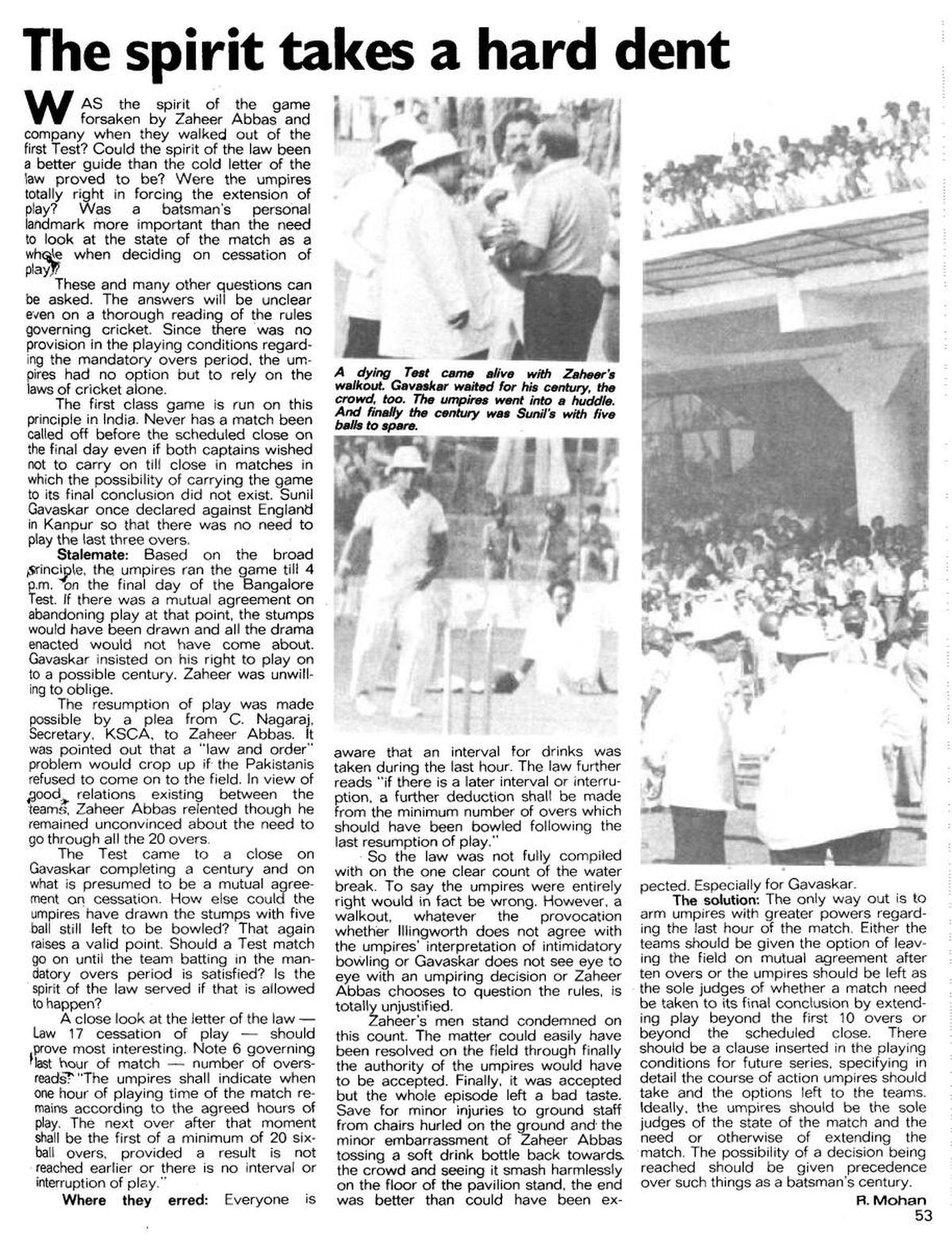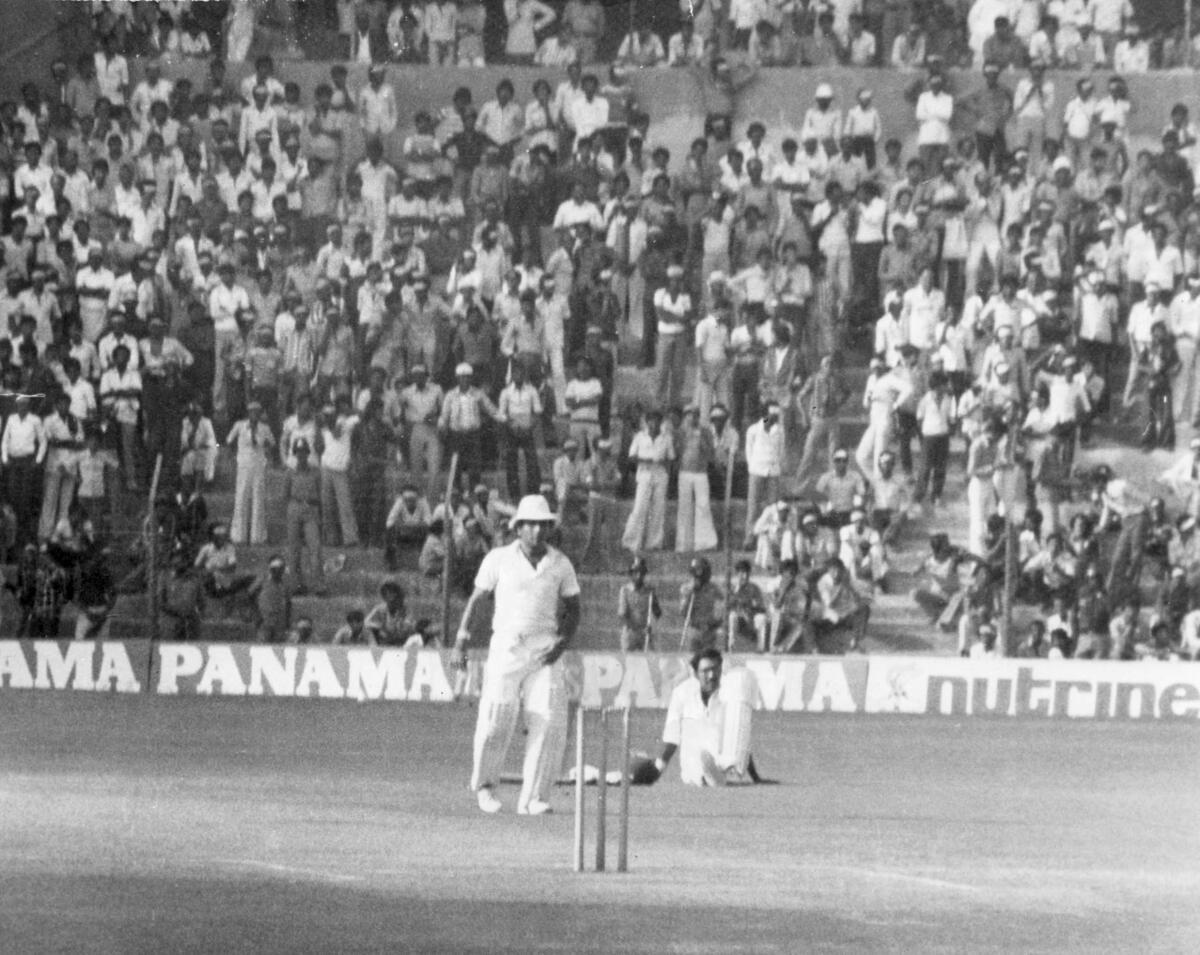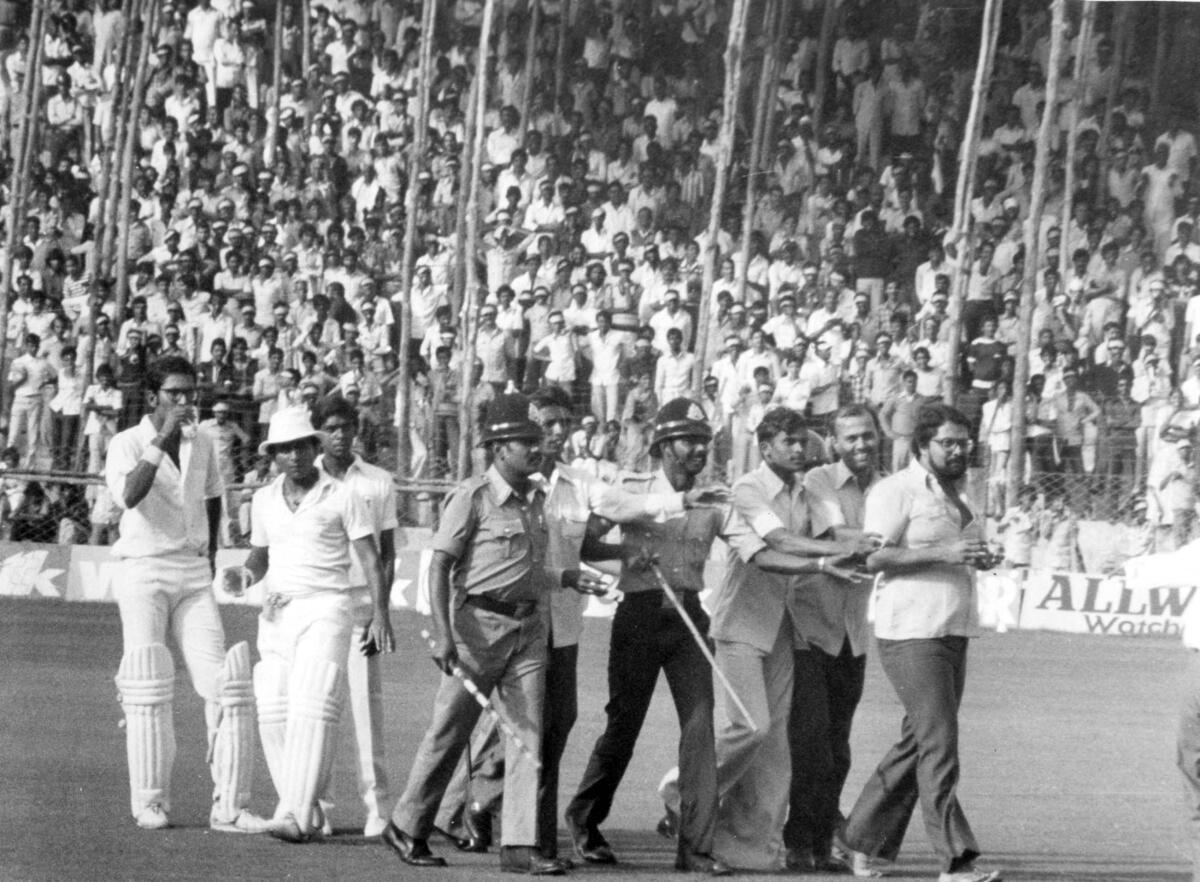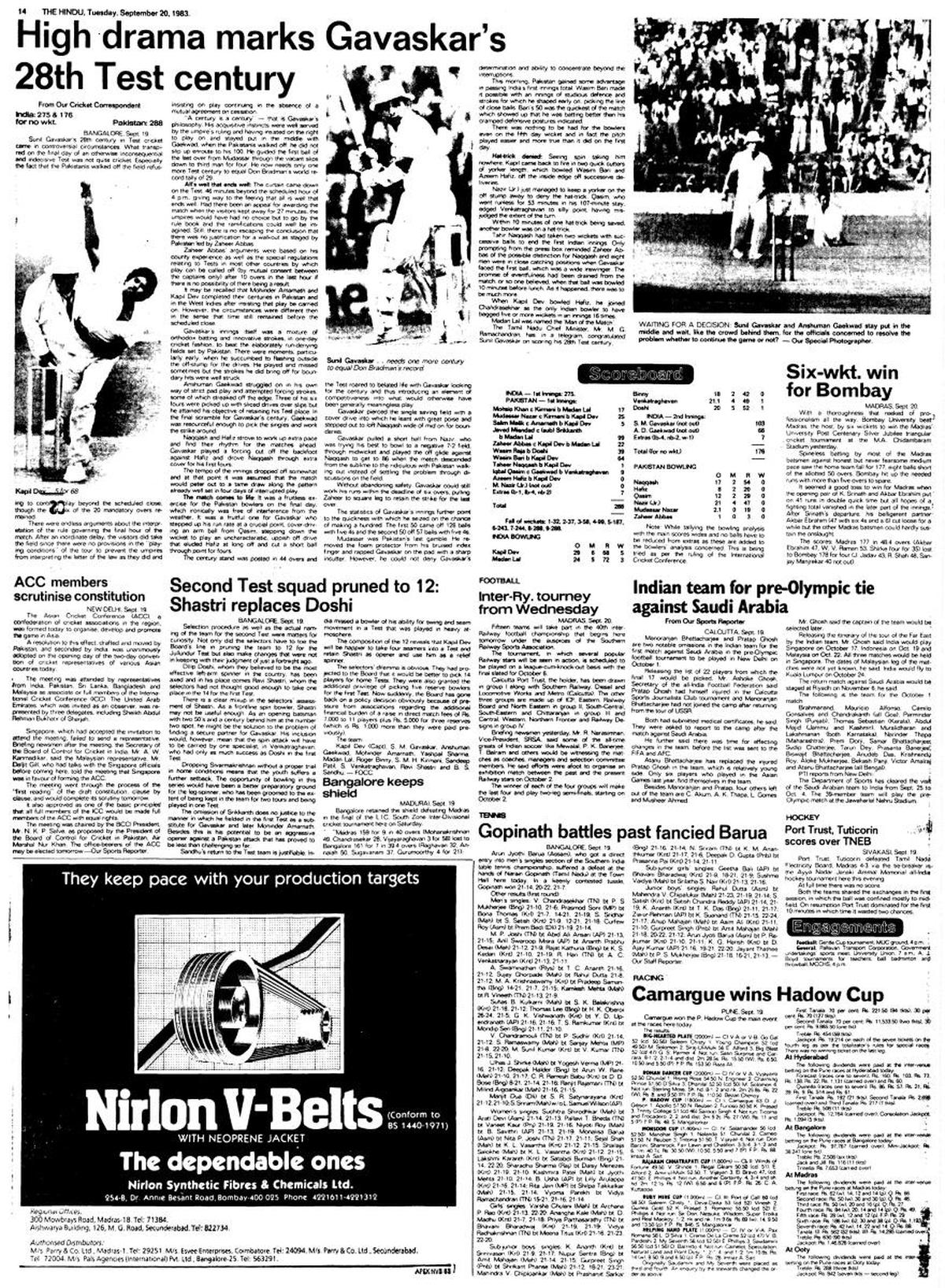England captain Ben Stokes, seeing the fourth Check at Manchester heading to a certain draw, determined to increase an invite to attract the match to provide his bowlers some added relaxation.
India had Ravindra Jadeja and Washington Sundar on strike, each inching nearer to their particular person centuries. The Indian administration determined to carry off on accepting the draw to permit the duo to register their lots of, which sparked a wave of displeasure and chatter from the England gamers.
The incident has sparked off a raging ‘spirit of cricket’ debate.
As historical past exhibits, this wasn’t the primary time a sport headed for a draw featured a participant eyeing a milestone and an sad opponent as a consequence. In 1983, in the course of the first Check between India and Pakistan in Bangalore, skipper Zaheer Abbas walked off along with his gamers earlier than the scheduled finish when 20 overs of play have been nonetheless left.
Right here’s the story by R. Mohan as printed in Sportstar in 1983:

The spirit takes a tough dent
Was the spirit of the sport forsaken by Zaheer Abbas and firm after they walked out of the primary Check? May the spirit of the legislation been a greater information than the chilly letter of the legislation proved to be? Had been the umpires completely proper in forcing the extension of play? Was a batsman’s private landmark extra vital than the necessity to have a look at the state of the match as an entire when deciding on cessation of play?
These and plenty of different questions could be requested.
The solutions might be unclear even on a radical studying of the foundations governing cricket.
Since there was no provision within the taking part in situations relating to the obligatory overs interval, the umpires had no choice however to depend on the legal guidelines of cricket alone. The primary class sport is run on this precept in India. By no means has a match been referred to as off earlier than the scheduled shut on the ultimate day even when each captains wished to not stick with it until shut in matches wherein the potential of carrying the sport to its ultimate conclusion didn’t exist.

Gavaskar and Gaekwad ready for play to renew after their opponents, Pakistan, strolling off the pitch en mass.
| Photograph Credit score:
SPORTSTAR ARCHIVES
Gavaskar and Gaekwad ready for play to renew after their opponents, Pakistan, strolling off the pitch en mass.
| Photograph Credit score:
SPORTSTAR ARCHIVES
Sunil Gavaskar as soon as declared in opposition to England in Kanpur in order that there was no have to play the final three overs.
Stalemate: Based mostly on the broad precept, the umpires ran the sport until 4 p.m. – on the ultimate day of the Bangalore Check. If there was a mutual settlement on abandoning play at that time, the stumps would have been drawn and all of the drama enacted wouldn’t have come about.
Gavaskar insisted on his proper to play on to a doable century. Zaheer was unwilling to oblige. The resumption of play was made doable by a plea from C. Nagaraj, Secretary, KSCA, to Zaheer Abbas. It was identified {that a} “legislation and order” downside would crop up if the Pakistanis refused to return on to the sector. In view of fine relations current between the groups, Abbas relented although he remained unconvinced about the necessity to undergo all of the 20 overs.

The Check got here to an in depth on Gavaskar finishing a century and on what’s presumed to be a mutual settlement on cessation. How else might the umpires have drawn the stumps with 5 ball nonetheless left to be bowled? That once more raises a legitimate level.
Ought to a Check match go on till the crew batting within the obligatory overs interval is happy? Is the spirit of the legislation served if that’s allowed to occur? An in depth take a look at the letter of the legislation — Regulation 17 cessation of play — ought to .show most fascinating.
Observe 6 governing ‘final hour of match — variety of overs reads: The umpires shall point out when one hour of taking part in time of the match stays based on the agreed hours of play. The subsequent over after that second shall be the primary of a minimal of 20 six-ball overs, supplied a end result just isn’t reached earlier or there isn’t any interval or interruption of play.
The place they erred: Everyone seems to be conscious that an interval for drinks was taken over the past hour. The legislation additional reads “if there’s a later interval or interruption, an extra deduction shall be made out of the minimal variety of overs which ought to have been bowled following the final resumption of play.”
So the legislation was not absolutely complied with on the one clear rely of the water break. To say the umpires have been fully proper would, in truth, be incorrect. Nevertheless, a walkout, regardless of the provocation whether or not Illingworth doesn’t agree with the umpires’ interpretation of intimidatory bowling or Gavaskar doesn’t see eye to eye with an umpiring determination or Zaheer Abbas chooses to query the foundations, is completely unjustified.

The report was printed in The Hindu on September 20, 1983
The report was printed in The Hindu on September 20, 1983
Excessive drama marks Gavaskar’s twenty eighth Check century
Sunil Gavaskar’s twenty eighth century in Check cricket got here in controversial circumstances. What transpired on the ultimate day of an in any other case inconsequential and indecisive Check was not fairly cricket. Particularly the truth that the Pakistanis walked off the sector, refusing to proceed past the scheduled shut, although a good bit of the 20 obligatory overs remained.
The curtain got here down on the Check, 46 minutes past the scheduled hour of 4p.m.. giving solution to the sensation that each one is nicely that ends nicely.
Had there been an enchantment for awarding the match when the guests saved away for 27 minutes, the umpires would have had no alternative however to go by the rule guide and the ramifications might nicely be imagined. Nonetheless, there isn’t any escaping the conclusion that there was no justification tor a walkout as staged by Pakistan led by Zaheer Abbas
Zaheer Abbas’ arguments have been primarily based on his county expertise in addition to the particular laws referring to Checks in most different nations by which play could be referred to as off (by mutual consent between the captains solely) after 10 overs within the final hour if there isn’t any chance of there being a end result.
It might be recalled that Mohinder Amamath and Kapil Dev accomplished their centuries in Pakistan and within the West Indies after insisting that play be carried on. Nevertheless, the circumstances have been totally different then within the sense that point remained earlier than the scheduled shut.
Zaheer’s males stand condemned on this rely. The matter might simply have been resolved on the sector, although lastly the authority of the umpires must be accepted. Lastly, it was accepted however the entire episode left a nasty style. Save for minor accidents to floor workers from chairs hurled on the bottom and the minor embarrassment of Zaheer Abbas tossing a tender drink bottle again in the direction of the group and seeing it smash harmlessly on the ground of the pavilion stand, the top was higher than might have been anticipated. Particularly for Gavaskar.
The answer: The one manner out is to arm umpires with larger powers relating to the final hour of the match. Both the groups needs to be given the choice of leaving the sector on mutual settlement after ten overs or the umpires needs to be left as the only real judges of whether or not a match must be taken to its ultimate conclusion by extending play past the primary 10 overs or past the scheduled shut. There needs to be a clause inserted within the taking part in situations for future sequence, specifying intimately the plan of action umpires ought to take and the choices left to the groups. Ideally, the umpires needs to be the only real judges of the state of the match and the necessity or in any other case of extending the match. The opportunity of a choice being reached needs to be given priority over things like a batsman’s century.

